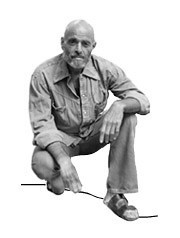What a life...
 Shel Silverstein was born on this day 82 years ago, although he shuffled off this mortal coil thirteen years ago. I admire Shel and the life he chose to lead. It is not a path I would have chosen myself, but I give him credit for an exceptionally interesting in life.
Shel Silverstein was born on this day 82 years ago, although he shuffled off this mortal coil thirteen years ago. I admire Shel and the life he chose to lead. It is not a path I would have chosen myself, but I give him credit for an exceptionally interesting in life.Shel famously said that as a kid he would have liked to be good at sports and popular with girls, but since he was neither he turned to drawing and writing. After he was drafted into the army, he turned his artistic skills to drawing slightly off-kilter comics for Pacific Stars and Stripes magazine. Not surprisingly, he was nearly court-martialed over one of his drawings.
Two years later, done with his Korean War service, he returned home to Chicago, looking for work. He walked into the offices of Hugh Hefner's new enterprise: Playboy Magazine. He walked out with a job and then turned that into a better job, working as a "travel columnist" for playboy. He traveled the world, writing and drawing comics about his experiences. That sounds like a pretty good gig for a young single man.
Shel was an unlikely success story in children's publishing. He didn't like children's books and felt they were condescending to kids. So, in 1960, Shel wrote a little book of his own called The Giving Tree, which started with the line "Once there was a tree... and she loved a little boy." It took him four years to find a publisher that would put it out. It didn't sell much early on, but started to spread through word of mouth and became a bestseller. Today, an author with that kind of success would have a series of kids books out within months. Not Shel. He released the immortal Uncle Shelby's Zoo shortly thereafter, but didn't release his next major kids book for another ten years, when he released Where the Sidewalk Ends. It took him another twenty years to release A Light in the Attic and Falling Up, all of which were big books in my house with my little girls.
That would be enough of a career for most any creative soul, but not Shel Silverstein. Shel also dabbled a bit in music, writing A Boy Named Sue for Johnny Cash, and The Unicorn for The Irish Rovers. He also wrote many of the best-known songs for one of my favorite bands - Dr. Hook and The Medicine Show - like The Cover of the Rolling Stone and Sylvia's Mother, not to mention Freakin' at the Freakers Ball.
Shel was also generous to a fault. If anyone around him contributed even one line to a song he was writing, he insisted on sharing the songwriting credit equally.
I shouldn't forget that he also wrote more than 100 plays. Oh, and he lived, off and on, at The Playboy Mansion, both East and West. He also won an Academy Award and was inducted into the Nashville Songwriter's Hall of Fame.
The term "renaissance man" is thrown around a lot, but it applied to Shel Silverstein. He had a reputation as being difficult to work with, but I think he just didn't feel as compassionate as he could have for people that didn't have his genius.
In the beginning of this post, I mentioned that I wouldn't have chosen his life's path. I said that because, for all his success and all his friends, I feel like he had a core of loneliness and restlessness that nothing ever filled. More than anything else, I think he wanted to see what was over the next horizon. He went over the last big horizon more than ten years ago, but I still think of him, his poems and his songs often.
And, I often think of these words, from Where the Sidewalk Ends:
"Yes we'll walk with a walk that is measured and slow,
And we'll go where the white-chalk arrows go,
For the children, they mark, and the children, they know
The place where the sidewalk ends."
Published on September 25, 2012 18:42
No comments have been added yet.



